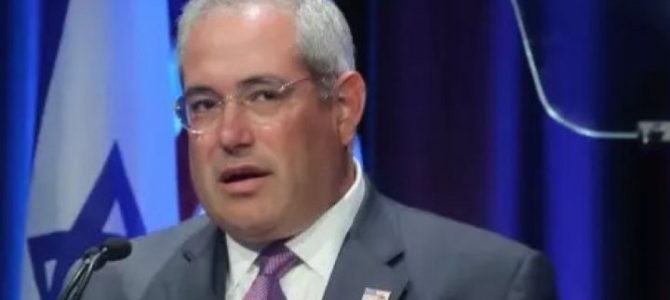

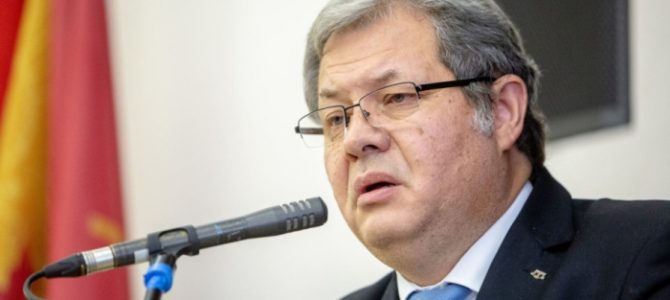
Three Historians and Institute Director Refuse to Work with Genocide Center
Three university history staff and the head of the Lithuanian History Institute report they cannot cooperate any loner with the Center for the Study of the Genocide and Resistance of Residents of Lithuanian (Genocide Center) because of the policies carried out by the leaders of the latter.
Lithuanian History Institute director Alvydas Nikžentaitis, Vilinius University History Faculty dean Loreta Skurvydaitė, Klaipėda University Baltic Regional History and Archaeological Institute director Vasilijus Safronovas and Vytautas Magnus University head of History Faculty Marius Sirutavičius sent notice of this decision to Lithuanian parliamentary speaker Viktorija Čmilytė-Nielsen Monday.
Meanwhile, Genocide Center general director Adas Jakubauskas reported some staff there are dissatisfied with reforms underway there and are making noises about that in the community of historians.
Internet Launch of Silvia Foti’s Book “in” Mexico City
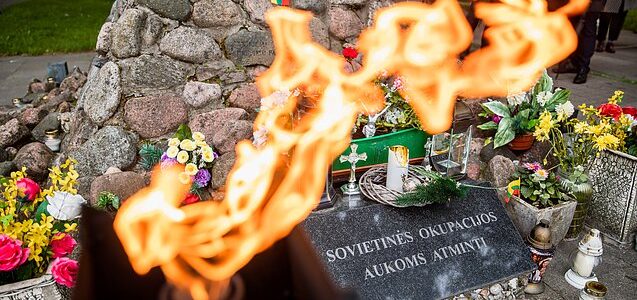
Unpleasant Surprise at the Genocide Center: Historian Warned over Doubts Expressed Publicly
Photo: Ceremony to commemorate victims of occupation, genocide and Soviet repression. J. Stacevičius/LRT
by Modesta Gaučaitė-Znutienė, LRT.lt

You speak up, you receive a warning. That’s what happened to a Center for the Study of the Genocide and Resistance of Residents of Lithuania (Genocide Center) historian who openly criticized the current situation there. The director of Genocide Center says the warning was issued because of unprofessional behavior.
LRT.lt reminds readers we have written before about doubts expressed by Genocide Center employees regarding attempts to politicize the Center’s activities as well as regarding the decision to present the status of freedom fighter to deputy general director Vidmantas Valiušaitis. Now it turns out historian Mingailė Jurkutė has received an official warning for publicly airing her concerns.
Received Letter from Advisor to the Director
Historian Monika Kareniauskaitė who no longer works at the Center shared a post on social media Thursday saying she still thinks the Center is one of the institutions working in the field of memory studies with the greatest potential. Nonetheless, she observed problems and poor practices which didn’t affect her alone. Kareniauskaitė said if she had been only one to suffer in this situation, she would’ve kept silent, but her colleagues were coming up against the same things.
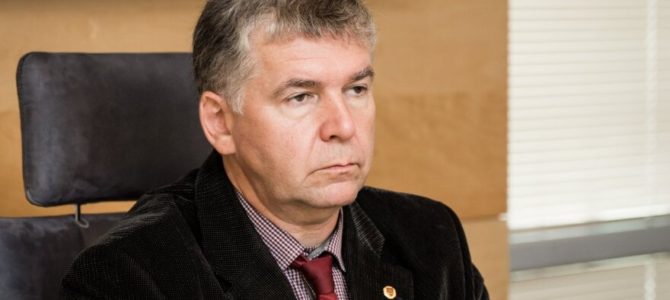
MP Rakutis Quits Commission Chair over Holocaust Comments
Delfi.lt, BNS
Conservative Lithuanian MP Valdas Rakutis has resigned as chairman of the parliament’s Commission on the Battles for Freedom and State Historical Memory following criticism of his statements about the Holocaust.
“Asked by the leadership of the Homeland Union/Lithuanian Christian Democrat [Conservative] Party and parliamentary faction, accepting political responsibility, and not wanting the very important work of the Commission on the Battles for Freedom and State Historical Memory to be made more difficult by this statement of mine, and also following the Western political tradition, I have decided to take the honorable step and to withdraw from the post of chairman of this commission,” the MP said in a statement released Friday. “I hope this step will help calm unnecessary tension both within the country and abroad with our important strategic partners, and will allow for further discussion to develop in a constructive direction,” he said.
Full story in Lithuanian here.
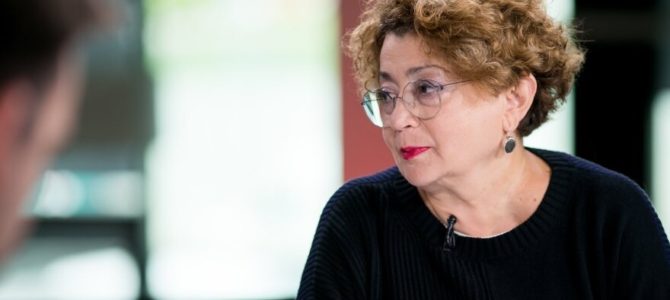
Lithuanian Jewish Community Chairwoman Demands Investigation for Holocaust Denial
DELFI.lt and BNS
Lithuanian Jewish Community chairwoman Faina Kukliansky reacted to MP Valdas Rakutis’s statement on the Holocaust by demanding the Office of General Prosecutor initiate a pre-trial investigation on Holocaust denial and distortion.
“Representing the Lithuanian Jewish Community, I demand … the prosecutor general begin a pre-trial investigation on Holocaust denial and distortion.
“Slaps on the hand don’t satisfy us. We, citizens of Lithuania, Jews living here, demand the rule of law and defense of our basic rights. And in the end, you should feel shame before those whose blood soaks the land of Lithuania,” Kukliansky said in a statement to the press.
The Office of Prosecutor General said they would consider beginning an investigation after they receive a complaint. “Currently this complaint has not yet been received, but if it is received, it will be considered in the prescribed manner and the corresponding decision will be made,” Office of Prosecutor General press representative Elena Martinonienė told BNS.
Thank You to All Participants in #MesPrisimename/#WeRemember Campaign

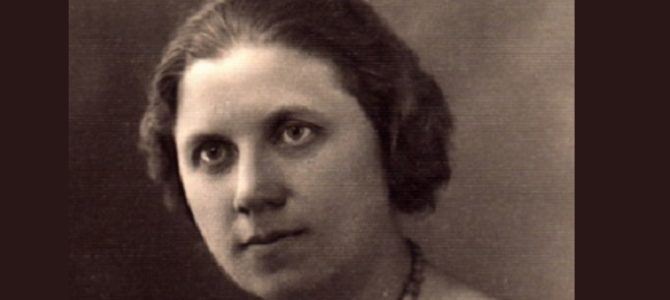
Ona Šimaitė: First Lithuanian Righteous Gentile Who Lived the Spirit of the National Anthem
Excerpts from Ona Šimaitė’s memoirs and Rimantas Stankevičius’s book “Gyvenusi tautos himno dvasia” [She Lived the Spirit of the National Anthem].
The Name Which Became Legend
Ona Šimaitė:
“I was too close to Jews during their time of great misfortune not to express my wonder at their unbreakable heroism and moral fortitude in the face of the death of their people on the other side of the barb-wire fence of the ghetto. You could say any people would have been broke physically and morally if they had to experience what every single Jew experienced. The Jews in the ghetto were heroes who never called themselves that.
“During that horrific time for Jews (and for all people of conscience) I often used to think that after it was all over, what the Jewish people had experienced would open the eyes of many people, and that we would only know about the hatred of Jews in archives and museums.
“But I was very wrong.
“Only a small portion of non-Jews remember the horrible means the Nazis used to exterminate thousands of Jews, and how Jewish children, women and the elderly were murdered.
“And shame to those who forget by whose hands this was accomplished, and who saved Jewish lives.”
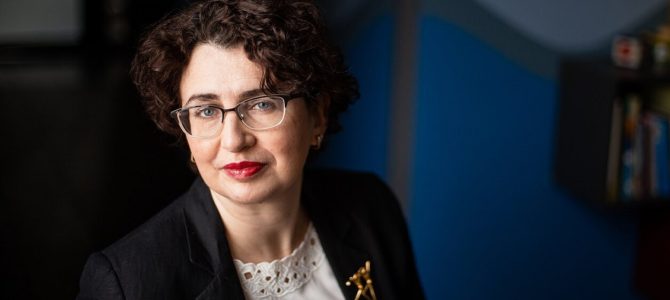
Interview with Ruth Reches on the Holocaust
Photo: Ruth Reches, by J. Stacevičius, courtesy LRT.lt
by Domantė Platūkytė
Life in the lion’s den, classmates as part of execution squads and concentration camps. These are aspects of Ruth Reches’s family life she shared with the LRT.lt website. Her grandmother after coming back from a concentration camp found the family home occupied. The new owners brought out a tub of water and let them spend the night on the ground in an adjacent shack. “What happened in Lithuania can’t be understood and explained rationally,” Reches said.
Reches, the principal of the Sholem Aleichem ORT Gymnasium and a doctor of psychology, gave an interview to LRT.lt and spoke about her grandparents surviving the Holocaust, the brutality of people and the impulse to aggression disinhibited by the war.
“When neighbors and classmates murder people… My grandfather’s mother was murdered by my grandfather’s brother’s classmates in Alytus. There are so many stories where teachers shot their students, and the town priest rang the bells so the shots wouldn’t be heard,” Reches, who has a published a book about the Holocaust and self-identity, said.
She said the experiences of the Holocaust haunted her grandparents their entire lives.
“The Holocaust left trauma in my grandparents’ lives because the environment to which they returned after the war was hostile and traumatizing. They returned to their hometowns and my grandparents saw their homes had been taken, and society wasn’t ready to accept them back. They felt no support from society, only anger that they had survivied,” Reches told LRT.

No More Lies. My Grandfather Was a Nazi.
The author’s grandfather, Jonas Noreika. Family photograph
In Lithuania, he was celebrated as a hero. But we can’t move on until we admit what he really did.
by Silvia Foti
Ms. Foti is a journalist and the author of the forthcoming “The Nazi’s Granddaughter: How I Learned My Grandfather Was a War Criminal.”
When I was growing up in Chicago during the Cold War, my parents taught me to revere my Lithuanian heritage. We sang Lithuanian songs and recited Lithuanian poems; after Lithuanian school on Saturdays, I would eat Lithuanian-style potato pancakes.
My grandfather, Jonas Noreika, was a particularly important part of my family story: He was the mastermind of a 1945-1946 revolt against the Soviet Union, and was executed. A picture of him in his military uniform hung in our living room. Today, he is a hero not just in my family. He has streets, plaques and a school named after him. He was awarded the Cross of the Vytis, Lithuania’s highest posthumous honor.
On her deathbed in 2000, my mother asked me to take over writing a book about her father. I eagerly agreed. But as I sifted through the material, I came across a document with his signature from 1941 and everything changed. The story of my grandfather was much darker than I had known.
Full story here.
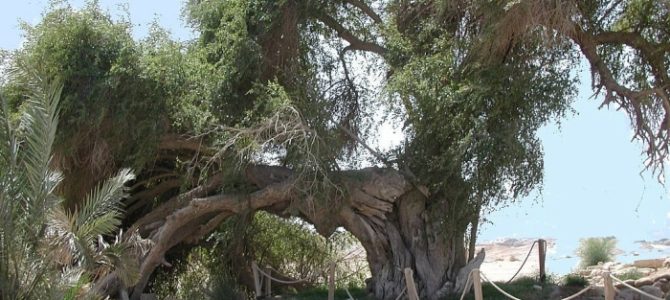
Tu b’Shvat
Today is the Jewish holiday of Tu b’Shvat, the 15th day of the month of Shvat, the New Year for trees also known as Israeli Arbor Day. It is traditional to eat of the shvat ha’minim (seven species endemic to the Land of Israel): wheat, barley, grapes, figs, pomegranates, olives and dates. Hag sameakh!
When No Eye-Witnesses Remain: LJC Invites Public to Internet Discussion on Holocaust
To mark International Holocaust Remembrance Day, the Lithuanian Jewish Community is holding an internet discussion called “When No Eye-Witnesses Remain” at 2:00 P.M. on Wednesday, January 27, at https://www.facebook.com/zydubendruomene
LJC chairwoman Faina Kukliansky, who helped initiate the virtual conference and plans to take part, said: “There are ever fewer Holocaust witnesses who can take an active part in educating society. When the last eye-witnesses die, all responsibility for preserving memory will pass to the younger generations. Memory of the Holocaust should become simply an history lesson where dates, names and locations are the most significant. It should be an eternal lesson in human moral values which moves the heart as well as the mind.”
Watch live, starting at 2:00 P.M.:
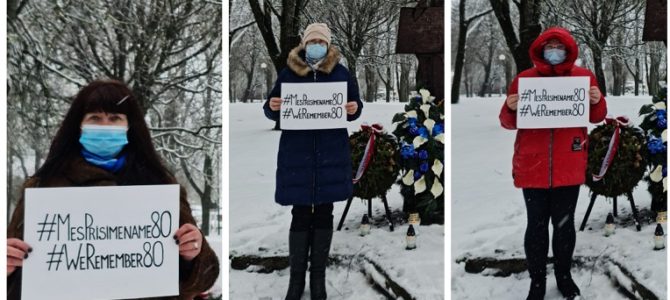
Remembering and Honoring Holocaust Victims: Global #MesPrisimename/ #WeRemember Campaign
by Nadežda Spiridonovienė, historian, museum specialist, Nalšia Museum
Lithuania along with the United Nations marks Holocaust Remembrance Day on January 27. Only by preserving the memory of the victims of the Holocaust can we create a safe future for humanity, the kind in which no anti-Semitism, racial, ethnic and religious hatred and discrimination would remain.
We remember the tragedy of the extermination of 6 million European Jews on International Holocaust Remembrance Day.
What happened to people during the Holocaust? What happened in Švenčionys where Lithuanians, Jews, Tartars, Ukrainians, Poles, Russians and other peoples lived together? Where within a territory of a few kilometers people prayed at Catholic church, five synagogues, the Orthodox church and other houses of prayer? What happened 80 years ago to people if there was such a catastrophe, and what can the younger generation do today to insure it never happens again?
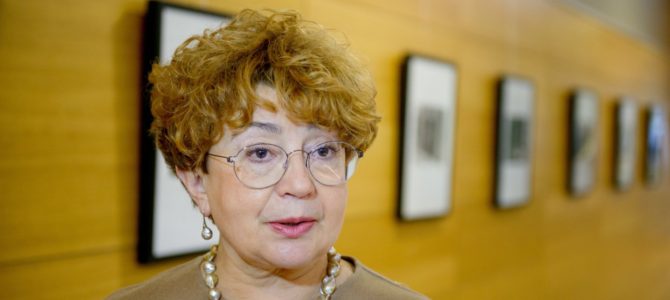
They Aren’t Beating Jews on the Street and Drawing Swastikas on Our Backs, But There’s Still a Lot of Hate
According to the Lithuanian Jewish Community, there are currently about 5,000 Jews living in Lithuania, constituting less than one percent of the country’s total population. Despite their small demographic spread, members of the Jewish community living in Lithuania continue to encounter a lack of tolerance and expressions of hate. Lithuanian Jewish Community chairwoman Faina Kukliansky says that although no one is beating Jews or drawing swastikas on their backs, there could be a lot more respect and the sense of shared humanity.
No lack of angry comments, go back to Israel
“Thirty years of independence have expanded our society’s horizons and made us more tolerant of one another. Travelling in other countries people begin to recognize diversity and realize we are all different. Even so, when some positive information appears in the public space about Jews and supportive of this community in Lithuania, there come endless disgusting comments and hate speech,” Kukliansky said.
She revealed she had experienced a number of anti-Semitic attacks in her life and therefore would never allow herself to think of another person as somehow lesser because of their ethnicity, race or other characteristics.

Implementing the IHRA Definition of Anti-Semitism for NGO Funding
About the speakers
Prof. Gerald Steinberg is founder and president of NGO Monitor and professor emeritus at Bar Ilan University. His current research focuses on the politics of human rights, soft power and non-governmental organizations (NGOs). His book “Menachem Begin and the Israel-Egypt Peace Process: Between Ideology and Political Realism” was published in 2019.
Ellie Cohanim served as deputy special envoy to monitor and combat anti-Semitism at the U.S. Department of State. Former deputy special envoy Cohanim helped inform and carry out policies and related initiatives that aim to counter global anti-Semitism at the State Department.
Mike Whine is a senior consultant at WJC. Between 2010 and 2012 he acted as lay advisor to the Counter Terrorism Division of the Crown Prosecution Service. In September 2013 he was appointed UK member of the European Commission Against Racism and Intolerance (ECRI), a human rights agency of the Council of Europe.
Olga Deutsch is vice president at NGO Monitor where she works with elected officials around the world. Olga brings extensive experience in international politics and Europe-Israel relations, and expertise in advocacy and building effective strategies to combat delegitimization, BDS and modern anti-Semitism.
The Institute for NGO Research, 10 Yad Harutzim , Jerusalem, 9342148 Israel
Register here.
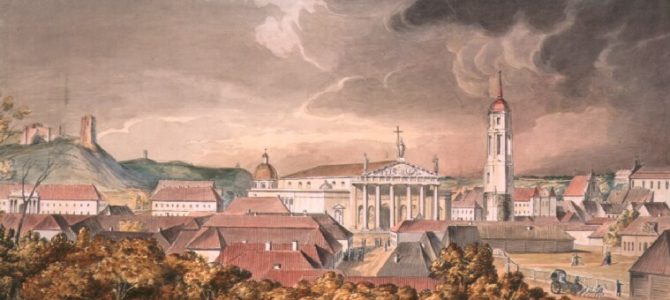
Happy Birthday, Vilnius
We are celebrating the official birthday of Vilnius with great enthusiasm and devotion, and on this occasion we would like to share with you an extraordinary work; Rafailas Karpis and Darius Mažintas accompanied by Dalia Dedinskaite on violin and Gleb Pyšniak on cello present the music video “A Tour of Jewish Vilnius” using the musical composition of Anatolijus Šenderovas.
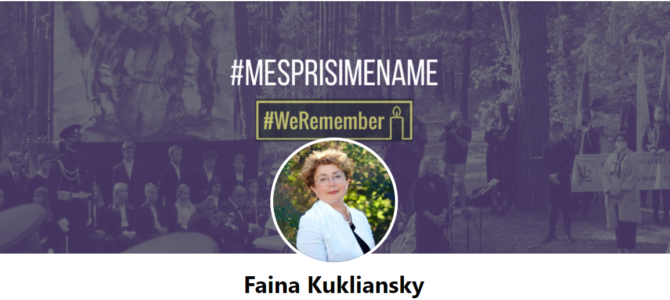
More on the #MesPrisimename Campaign to Remember the Victims of the Holocaust
International Holocaust Remembrance Day will be marked around the world January 27 and the Lithuanian Jewish Community has and is inviting the people of Lithuania to join the #MesPrisimename (#WeRemember) campaign to remember the Jewish communities of Lithuania’s cities and towns exterminated in the Holocaust, the survivors and the rescuers.
“We remember the tragedy of the destruction of six million Jews of Europe every year at this time. We invite everyone–heads of state, politicians, the entire academic and education community and all the people of Lithuania–to remember on the eve of International Holocaust Remembrance Day the people who were murdered in the flames of the Holocaust. This is our shared loss, the loss of the entire country,” Lithuanian Jewish Community chairwoman Faina Kukliansky said.
“We appeal to the entire academic and education community: use the opportunity this day provides and give attention to educating young people on commemorating the victims of the Holocaust. Hold virtual meetings with older members of the Jewish communities who remember these horrific periods of history. We still have the unique opportunity to speak directly with the eye-witnesses of these events, so let’s use it,” she added.
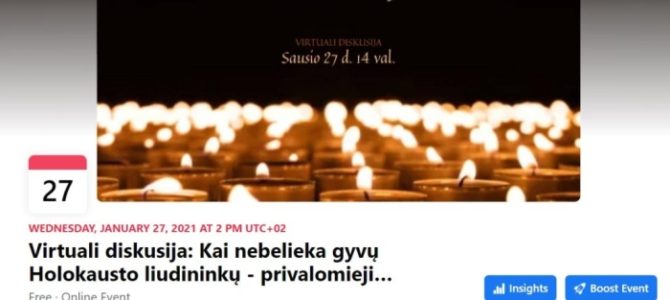
Internet Discussion: When All Eye-Witnesses to the Holocaust Are Gone
The Lithuanian Jewish Community is holding an internet discussion on International Holocaust Remembrance Day, January 27, called “When All Eye-Witnesses to the Holocaust Are Gone, There Must Still Be Public Commemorations.” The internet discussion is scheduled for 2:00 P.M. Wednesday.
Participants are to include LJC chairwoman Faina Kukliansky, writer and law professor Justinas Žilinskas, Institute of the History and Archaeology of the Baltic Region Hektoras Vituks, Human Rights Monitoring Institute executive board member and philosopher Paulius Gritėnas and director of the Media and Democracy Program of the Vilnius Policy Analysis Institute Donatas Puslys. Šeduva Jewish Memorial Fund director and writer Sergejus Kanovičius is to moderate the event.
Those interested in “attending” are invited to go to the LJC facebook page for the event or youtube channel at the designated time and date.
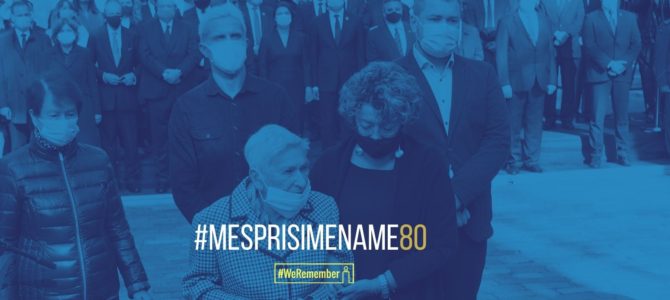
#MesPrisimename Campaign to Mark International Holocaust Remembrance Day
The annual commemoration of International Holocaust Remembrance Day takes place on January 27, the day Auschwitz-Birkenau was liberated, and this year will mark the 76th time the United Nations’ commemorative day has been marked.
The Lithuanian Jewish Community wants to use this day to teach young people about the Holocaust and to hold virtual meetings between young people and survivors.
The LJC invites you to join the #WeRemember campaign on social media, which is called #MesPrisimename in Lithuanian. You can make a sign or inscription with either variant and photograph yourself with it, then post it with these hashtags, and send it projects@lzb.lt before January 25.

